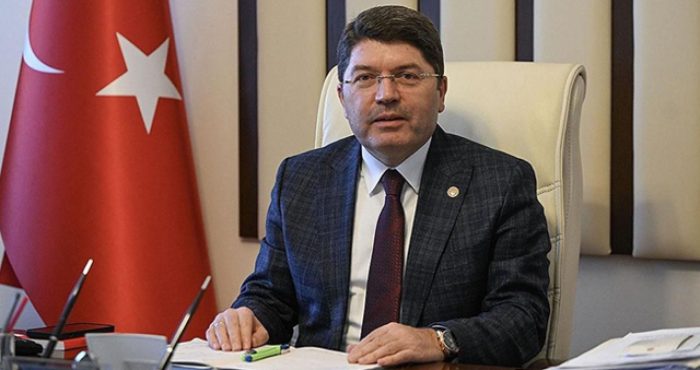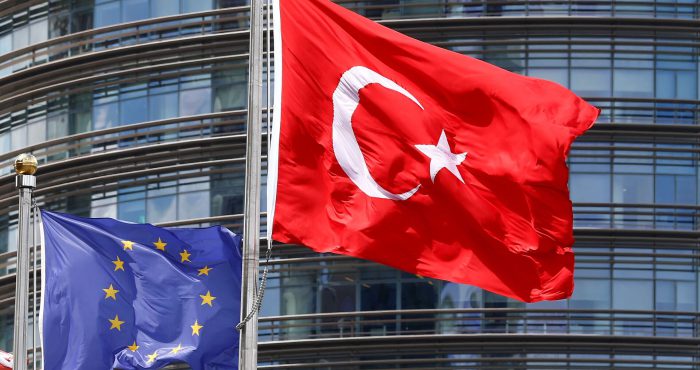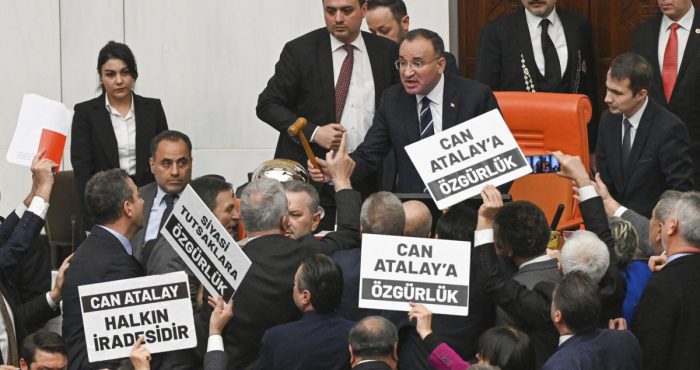Can President Recep Tayyip Erdoğan run again in the 2023 elections?
While the ruling Justice and Development Party (AKP) members think certainly he can, the chair of the Republican People’s Party (CHP) Kemal Kemal Kılıçdaroğlu announced “We will not have a discussion about Erdoğan’s candidacy. If he wishes to run he is more than welcome.”
This is the million dollar question as Murat Yetkin puts it, keeps the jurists and opinion leaders busy. Most of the debates unfold the question “What does Mr. Erdogan need to do so he may run for the third time to be elected president?”
Constitution is clear and unambiguous
Finding the answer of this question is quite easy by reading the relevant provisions of the Constitution objectively free from prejudice and make sense of it by following the rules of logic. One must not give a wishful meaning to rules; and if connotation bears ambiguity and contradiction, we could annotate.
According to unambiguous provision of Article 101(2) of the Constitution that explicitly states without hesitation “A person can be elected President maximum two times” Mr. Recep Tayyip Erdoğan cannot be elected President for the third time.
However, Mr. Erdoğan may run third time to be elected president according to definite and unambiguous provision of Article 101(3) of the Constitution stating; “political party groups [in the parliament], political parties that received minimum 5 percent of the total votes alone or in aggregate and a hundred thousand of electorates may designate a candidate for presidency.”
Third time run is conditional
Immediately this comes to mind: Is there a provision that explains the difference between the provision of the Constitution in articles 101(2) and 101(3). For what reason and in which circumstances a person that could not be elected as president a third time but could run?
Article 116(3) provides for such an exceptional circumstance. Pursuant to said article 116(3) the president may run another time in the event the Parliament resolve to renew elections during the second term of his presidency.” Article 116(3) sets out the only exception to the prohibition of being elected a third time in Article 101 explicitly as the circumstance “when the parliament resolve to renew the election.”
On the contrary Article 116(2) does not grant the president the right to run another time in the circumstance that he himself resolves “to renew elections. It is only natural that a president terminating his own term is not granted to run another time because if s/he had wished to continue serving he would have not terminated his own term.
Therefore, only in the event of parliament establishes renew the elections – if the parliament could do – the president serving in their second term could run to be elected president.
Which term is Mr. Erdoğan serving in?
The controversy about Mr. Erdoğan’s running refer to the fact that he is serving in his second term of presidency. If it was about his first term neither the Article 101 nor Article 116 would be relevant and his right to run would have been accepted without any dissent.
The Speaker of the Parliament Mr. Mustafa Şentop who was among the people drafted the 2017 amendment, attempts to divert the dispute to his vague argument of Mr. Erdoğan serving in his first term. He claims that Mr. Erdoğan was elected as the president the first time in 2018 and insinuates that he could stand run in 2023 elections by saying; “There are no obstacles to his running. Article 101 concerning the candidacy was totally replaced. This article came to exist within the amendment accepted in the 2017 by referendum. In April 2018 the new article 101 entered into force and the old one was repealed.”
It is worth noting that Mr. Şentop asserts that Mr. Erdoğan may run according to the rule in Article 101 and not according to the exception provided for in Article 116(3).
For he is a member of the AK Party, he is personally conflicted because he has to defend the amendment that he personally contributed, Mr. Şentop’s views should not be credited. But leaving that aside, let’s briefly consider this claim.
Presidency always existed, not founded in 2018
Mr. Şentop’s statement saying “the article was totally replaced; in April 2018 a new Article 101 came to force and the old one was repealed” is only an attempt to twist.
The Presidency (of People) is an institution always existed since the formation of the Turkish Republic and was not founded by the 2017 amendment. From the beginning either solely or shared with the cabinet it has enjoyed executive powers. in 2017 it was enacted to be elected by the public. the 2017 amendment vested all executive powers with the president. Indeed, the Article 7 of the law no 6771 concerning the amendment of Article of 101 in 2017 states “Article 101 [of the constitution] has been amended as follows” and demonstrate that “in April 2018 no new article entered into force and no article was repealed; only an amendment was made into an article that existed previously.
Therefore Mr. Erdoğan, who was elected as president in 2018 is serving in his second term. With the easy refutation of the aforementioned article (7), Mr. Şentop’s view to the contrary confirms this conclusion with its base of thought.
The constitution cannot contradict or fool itself
The main topic to be argued, challenged and clarified is as to whether the Constitution would allow itself to elude its prohibition that a person cannot be elected as president more than two times. Because the two possibilities that I summarize below give an impression as if the constitution contradicts itself by article 116(3) and allows for the bypass of maximum two terms and 10 years in aggregate presidency rule:
(1) How consistent it is with the essence of Article 101 of the Constitution to extend the president’s 5 years second term to a de facto term of 9 years 6 months through the parliament’s renewal of elections? In other words until when the Parliament should be authorized to renew elections?
(2) Could, at all, the Constitution be considered allowing for de facto extension of the president’s term indefinitely by succession of parliament’s renewal of elections each time a couple of months prior to end of the term?
Renewal of elections is not a snap election
In this respect the topic that needs to be carefully considered is the meaning of the term “renewal of elections.” In 2017, in my view unnecessarily, the heated debates as to whether renewal of elections meant termination however omitted to discuss as to why the term “renewal of elections” were preferred instead of using clearer terms such as “snap elections” or “election prior to expiry of the term” and the potential consequences of this preference.
Renown jurist Turgut Candan wrote on 30 March 2017 on his personal blog, reminding the president’s authority to renew parliamentary elections pursuant to Article 116 of the Constitution prior to 2017 amendment states that “in the event the government cannot be formed, does not receive vote of confidence or loses the same along with the president also the parliament’s authority to renew elections are regulated through amendment.”
The term “renewal of elections” has acquired a unique meaning in Turkish constitutional law. This meaning is such that renewal of elections is a last resort of cure in the circumstances where a government cannot be formed, does not receive vote of confidence or a new one cannot be force in place of an ousted one either as a result of the results of an election or the occurrence of extraordinary developments with the reconsideration of the electorate.
Conditions for renewed elections are absent
Following the 2017 amendments “renewal of elections” should be understood as renewing elections to address with the resolution of the electorate the kind of circumstances where functioning of the executive or the legislative powers of the state has become immensely extraneous or impossible due to forceful reasons. The fact that 2017 amendments repealed the parliament’s authority under Article 77 to resolve for snap election supports this conclusion.
The disorders occurred in the parliamentary system is likely to occur in the presidential system, President’s ability to function due to health and similar circumstance, the structure and arithmetic of the parliament tying up either the legislative or the executive would also cause to de facto absence of executive power or to unsustainability of the executive. Only when it appears as the last cure such circumstances renewals of elections may be resorted to.
On the other hand the principal rule in Article 101 that provides for maximum two terms in presidency and each term being 5 years cannot be interpreted as allowing for circumvention and extending it to a de facto 3 terms or more or exceeding the aggregate 10 years terms.
Consequently, unless there are extraordinary circumstances similar to the ones described in the amended Article 116 neither the president nor the parliament may resolve to renew elections.
Elections cannot be renewed within 6 months till June 2023
The debate about the 2023 elections focus on how Mr. Erdoğan could run for the 3rd time and extend his term instead of whether the conditions for renewal of elections exist.
With the end of a 5-year presidency term and less than 6 months left to June 2023, the parliament cannot resolve to “renew the elections”. The authority of the parliament to decide on early elections was abolished with the 2017 amendment. Therefore, the elections have to be held in June 2023 at the end of the normal period.
In the event the parliament resolves to renew elections with the vote of 360 deputies i.e., sufficing the quorum in Article 116(3) this may appear consistent with the letter of the constitution however it breaches the essence of it that is to say that any one person’s presidency is limited to two times and a maximum of 10 years for service term. Because the people who voted for the 2017 amendments may not have resolved to limit one’s presidency with 2 terms and maximum 10 years and at the same to allow for it to be extended to 3 times and to 14 years and 10 months by circumventing the same in a cheating manner.
In the event it is resolved to renew to elections or to be carried out at an earlier date in absence of extraordinary circumstances it would be wise to take the matter to the Constitutional Court in the form of individual complaint or an invalidation action, it should be adjudicated promptly securing elections to be carried out in the normal date.
What might the chairman of the elections board Insinuate?
The Chairman of the Supreme Board of Elections (YSK) Muharrem Akkaya, in his interview with Alican Uludağ of DW Türkçe, says “I made my view in relation to Erdoğan’s candidacy. I have consulted this matter with a trusted friend of mine who is a constitutional law jurist. We researched and I formed my view.”
The public has the right to hear as to who Mr. Akkaya consulted with, on which basis he did so, according to which criteria he preferred those he consulted with, and what questions were asked and sought answers to, and also why he felt the need to do this. Given that he is a seasoned jurist and a senior member of the Court of Cassation, and the provisions of the Constitution are very clear and completely unambiguous that requires to skilled interpretation why did he feel the need to consult with third parties?
Could the chairman of the YSK be insinuating something different than he expressed because the matter does not require consultation with others? Mr. Chairman’s answering all these questions in a way that leaves no question marks or doubts is of vital importance for the vote he will cast on the most important legal issue of our country and the decision to be taken by the YSK.
A reminder for the YSK Chairmanship
In the first six months of 2023, YSK will make more important decisions in the history of democracy and rule of law in our country, perhaps even more so than in 1950 For example, YSK will make resolutions about Ekrem Imamoğlu according to developments in the appeal and cassation phases about his conviction and prohibition from politics and our country will either acquire a candidate for a leader or expend it. YSK’s decisions will also determine as to whether Mr. Erdoğan can be run one more time and whether AK Party will remain in our political life and maintain its weight.
As it is very well known per Article 79 of the Constitution and the Law 7062 the board consists of 7 principal and 4 substitute members. Following the election of the chairperson and vice chair two substitute members from among the members appointed by the Court of Cassation and the State Council are determined by drawing names from among them.
It was discovered that the YSK board had not determined its principal and substitute members upon annulment of the Istanbul Metropolitan Municipality elections. According to information on YSK official web page as of 3rd January 2023 the board appears to have not determined its principal and substitute members. However, in order for the board to be legally formed it is compulsory that the principal members and the substitutes need to have been determined. It is obvious that any 5 persons from among 9 members who are not known whether principal or substitutes cannot form the board. This situation prevents the institution of the legal organ required by the law and causes any resolutions made in the name of the board to be null and void. This is because it is legally impossible for people to vote as if they had been determined to be principal despite, they had not been determined to be either principal or substitute and therefore to resolve in the name of the legal entity as if they form the board.
Nevertheless acting against the requirements of ones (official) duties causing to the detriment of persons or the public loss as an offence by Turkish Criminal Code in Article 257(1). Also committing an act toward deterioration of the unity of the state and weaking of the sovereignty of the state has been described among offences against state security in Article 302(1) of the Turkish Criminal Code.
A Word to CHP and to Mr. Kılıçdaroğlu
CHP and Mr. Kılıçdaroğlu avoid debating whether Mr. Erdoğan’ could run or not. Moreover, they do not discuss the fact that the parliament or the President’s decision to renew the elections is unconstitutional due to the absence of the necessary extraordinary conditions. On the contrary they speak of a discourse that contradicts the wording of Articles 101 and 116 of the Constitution and allows to maneuver around Constitution’s basis.
Mr. Kılıçdaroğlu says that Mr. Erdogan has elected the members of the YSK, and he is able to have the board of YSK vote against his candidacy to be able to play the victim. Mr. Kiliçdaroglu says he intends to beat him at the ballot box.
With what right and on which basis could Mr. Kılıçdaroğlu or any political party compromise a clear provision of the Constitution and they participate in the decision to renew the elections?
Despite Mr. Erdoğan’s candidacy is highly controversial and is a consitutional issue how could Mr. Kılıçdaroğlu, who have walked 441 kilometers from Ankara to Istanbul seeking justice and tautologizing the rule of law be able to ignore the constitution and the rights of the people? When would Mr. Kılıçdaroğlu defend the rule of law if he would not fight for it in relation to constitution?
In conclusion: The Constitution has abolished the Parliament’s authority for snap elections, there are no extraordinary conditions that require the renewal of the elections, and in these circumstances; since the basis of the Constitution does not permit the President or the parliament to renew the elections unless the Constitution is amended by agreement of the government and the opposition, the elections can be held on the legitimate date of 18 June 2023.




